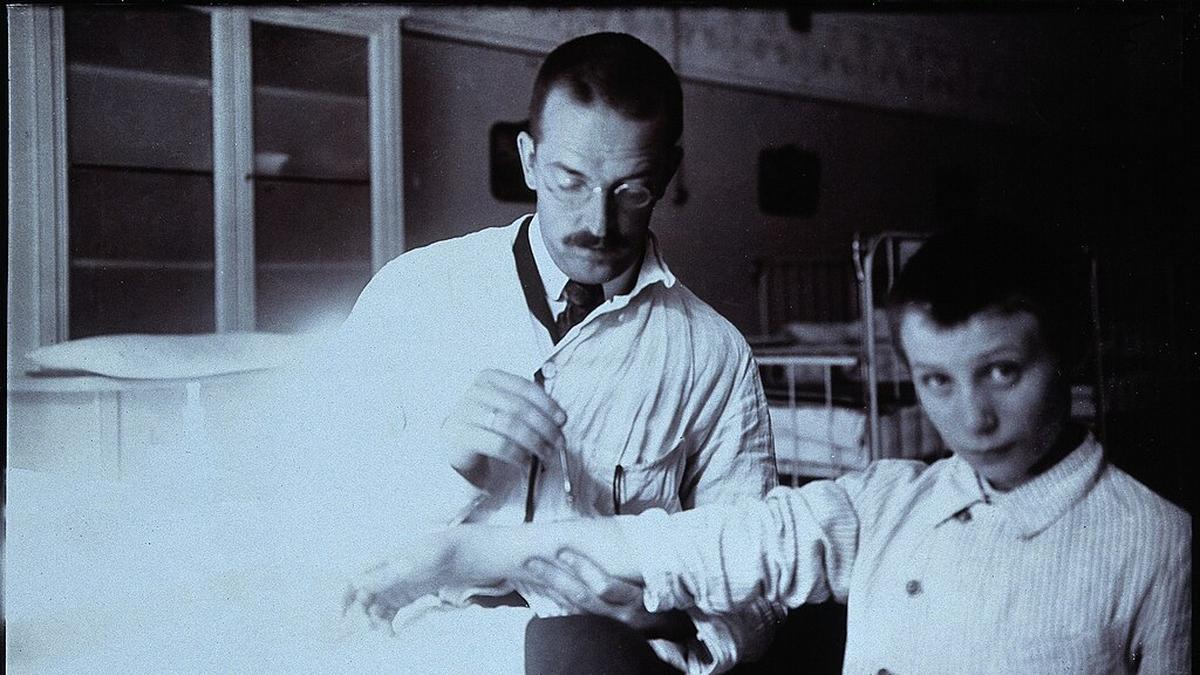Anyone can develop an allergy. And in times like these, when the weather keeps fluctuating unpredictably, it becomes even more crucial to stay informed. Understanding the facts about allergies can help you or your loved ones recognise symptoms early, avoid common triggers, and manage flare-ups better.
So, how allergy-aware are you? Here’s a small quiz to test your knowledge on allergies.
Science Quiz | On allergies
The term “allergy” originates from Ancient Greek words. This Viennese paediatrician,in the figure (to his left, his patient) introduced the term in 1906, combining the Greek words “allos” (other, different) and “ergon” (work, action). He used it to describe a changed or altered immune response to foreign substances. The German word “Allergie” was used as a translation of his concept, which later became “allergy” in English. He is also best known for developing the tuberculin skin test, a diagnostic tool for tuberculosis, which he termed the “Pirquet reaction” or “Pirquet’s test”
START THE QUIZ
1 / 10 |
Allergies are caused by an overreaction of the immune system to substances that are usually harmless.
2 / 10 |
The hormone ____ is commonly used as a first-line emergency treatment for anaphylaxis.
3 / 10 |
Which antibody is primarily involved in allergic responses?
4 / 10 |
What type of medication is commonly used to relieve mild allergy symptoms such as sneezing and itching?
5 / 10 |
Name one common environmental allergen that can trigger respiratory allergic reactions like asthma or rhinitis.
Answer : Acceptable answers include : pollen, dust mites, mold spores, or pet dander
DID YOU KNOW THE ANSWER?
YES
 NO
NO

SHOW ANSWER
6 / 10 |
This Austrian paediatrician introduced the term “allergy” in 1906. Who is he?
7 / 10 |
What is the severe symptom of allergy ?
Answer : A severe allergy symptom is anaphylaxis : a life-threatening allergic reaction that can cause difficulty breathing, swelling of the throat or tongue, and a drop in blood pressure
DID YOU KNOW THE ANSWER?
YES
 NO
NO

SHOW ANSWER
8 / 10 |
Can allergies be cured permanently?
Answer : No cure, but management . While a permanent cure for allergies is “not” yet available, allergies can be effectively managed and, in some cases, even reduced or even resolved over time. Medications, lifestyle changes, and allergy shots (immunotherapy) can help control allergy symptoms and even desensitize the body to certain allergens
DID YOU KNOW THE ANSWER?
YES
 NO
NO

SHOW ANSWER
9 / 10 |
What does “Hypoallergenic products“ mean ?
Answer : Hypoallergenic products are designed or formulated to minimise the risk of causing allergic reactions. They contain fewer allergy-producing substances (allergens) than non-hypoallergenic products. While “hypoallergenic” implies a reduced likelihood of allergic reactions, it doesn’t mean the product is entirely free of potential allergens.
DID YOU KNOW THE ANSWER?
YES
 NO
NO

SHOW ANSWER
10 / 10 |
Name any three types of allergy tests
Answer : Three main types of allergy tests are skin prick tests, intradermal tests, and patch tests. Skin prick tests involve applying drops of suspected allergens to the skin and pricking it. Intradermal tests inject a small amount of allergen solution into the skin. Patch tests involve applying patches containing allergens to the skin for a set period and then evaluating for reactions. Also acceptable answers : blood tests (IgE), and challenge tests (oral food challenge, medication challenge)
DID YOU KNOW THE ANSWER?
YES
 NO
NO

SHOW ANSWER
Published – June 06, 2025 10:00 am IST


